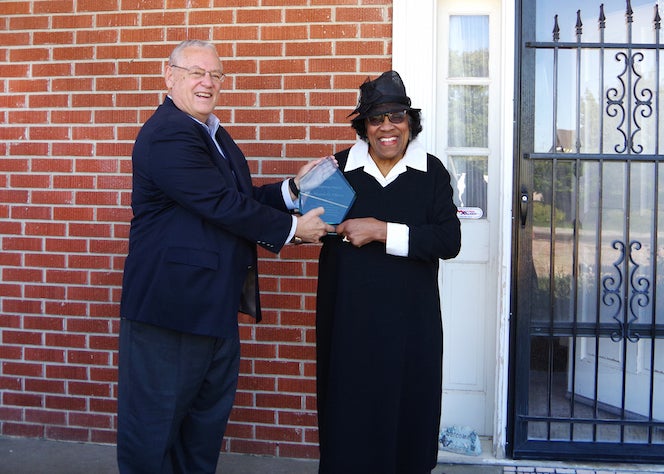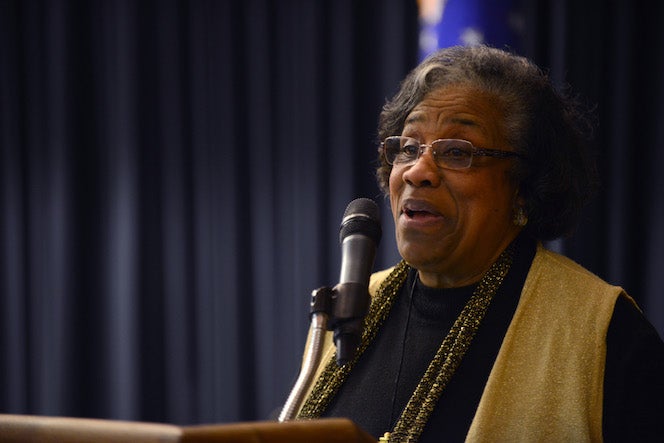
A lot was happening in 1972: the Vietnam War, the Watergate scandal. In Northern Idaho, the Sunshine Mine disaster killed 91 men. “The French Connection” won the Oscar for best picture. Closer to home, Mamie Oliver began her 16-year career at Boise State.
Oliver, 85, was the first Black professor at the university. She taught social work, sociology and education. A first generation college student herself, Mississippi native Oliver grew a reputation as an advocate for women, children, families, and the elderly.
She came to Boise with her husband, Henry Lincoln Oliver, after he accepted the position of pastor at St. Paul’s Baptist Church. The Olivers encountered a campus, and a city, where most people were white. Mamie Oliver sought, nonetheless, to document the history of Black Idaho. She enlisted her Boise State students in this work, gathering census data and other historic records. Many of her students were from small, rural towns where they hadn’t been exposed to diverse cultures.
“I wanted to engage students in the classroom, but also beyond the classroom,” said Oliver. “I wanted to expose them to the stories of all the people who lived in this state, but also to their own histories, to help them become aware of their own families’ stories.”
Oliver has written several books, including “Blacks in Idaho’s White Press” and “Idaho Ebony: The Afro-American Presence in Idaho State History.”
Though Oliver went on to teach at other institutions, including Northwest Nazarene College, and is currently pastor at Mountain View Community Fellowship, a multicultural Boise congregation, her ties to Boise State remain strong. Oliver’s husband taught at Boise State. Her son, Jon, and daughter Sharon, graduated from Boise State with degrees in business and music, respectively. Oliver is still in touch with students she met decades ago. She’s godmother to the children of some former students.
“I’m grateful we could come into a place where we established such relationships,” said Oliver. “Boise State has expanded my family.”

Oliver still urges young people to know this community, one that’s growing and diversifying. She challenges anyone to broaden their definitions of what community is and to look critically at their long-held beliefs. The Idaho State Historical Society interviewed Oliver for a recent online program, History Happy Hour: Idaho Ebony.
“I would encourage people to take personal inventory,” Oliver told interviewer Alison Espindola. “What do I feel about people who are different from myself? See if it’s positive or negative. Is it factual or just something I’ve heard, or something I’ve learned to believe based on what people have told me?”
“We’ve got a lot of personal work to do for our communities to change, for our nation to change, and for our politics to change,” said Oliver.
She spoke from her pastoral perspective.
“What kind of heaven do you plan to go to if you believe in heaven? There won’t be a Black heaven and a white heaven. That’s not going to be true. So we better get it straight down here.”
Oliver has chaired the Martin Luther King Jr. Task Force and the Council for Families and Children. Oliver led the effort to list St. Paul’s Baptist Church in the National Register of Historic Places. The building is now the Idaho Black History Museum in Julia Davis Park. Oliver received the 2020 Esto Perpetua Award from the Idaho State Historical Society. The award – the state’s highest for history – honors those who have made significant contributions to the preservation of Idaho history through professional accomplishments, public service, volunteerism or philanthropy.
Opening March 13: ‘Trailblazing Women of Idaho’
An exhibition at the Idaho State Museum, “Trailblazing Women of Idaho,” will feature Oliver along with more than 80 significant women from the state’s past and present. Sarah Phillips, curator of collections and exhibits, said Oliver is included in the exhibition’s Voices of Change section. It highlights women known for raising awareness in their communities, working to build a better world, and preserving the culture of sometimes disenfranchised groups. For the exhibition, Oliver loaned items that are personal, but also represent Black culture: the church hat she wore to celebrate her pastoral anniversary at Mountain View Community Fellowship, a fan she used during services at St. Paul’s Baptist Church, and the pastoral stole she wore as a professor at Northwest Nazarene College.